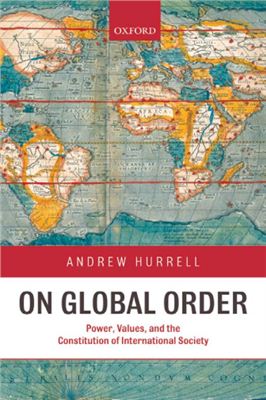Oxford University Press, 2007. 354 p.
This is one of the finest books on the normative dimension of global goveance published in the past decade. Utilizing insights from the English School, liberal institutionalism, and constructivism, the author addresses some of the most profound questions on the nature, limitations, and possibilities of global order in the twenty-first century. Andrew Hurrell, a former student of Hedley Bull, goes beyond the traditional concept of an anarchical society based on minimalist conditions of coexistence and suggests a fresh approach to understanding what kinds of political organizations we need in the future. To do so, he explores three major challenges in global society: the need to capture shared and common interests, the imperative to manage unequal power, and the need to mediate cultural diversity and value conflict.
Frameworks.
The anarchical society revisited.
State solidarism and global liberalism.
Complex goveance beyond the state.
Issues.
Nationalism and the politics of identity.
Human rights and democracy.
War, violence, and collective security.
Economic globalization in an unequal world.
The ecological challenge.
Alteatives.
One world? Many worlds? .
Empire rebo? .
Conclusions.
The state of inteational society and the pursuit of justice.
This is one of the finest books on the normative dimension of global goveance published in the past decade. Utilizing insights from the English School, liberal institutionalism, and constructivism, the author addresses some of the most profound questions on the nature, limitations, and possibilities of global order in the twenty-first century. Andrew Hurrell, a former student of Hedley Bull, goes beyond the traditional concept of an anarchical society based on minimalist conditions of coexistence and suggests a fresh approach to understanding what kinds of political organizations we need in the future. To do so, he explores three major challenges in global society: the need to capture shared and common interests, the imperative to manage unequal power, and the need to mediate cultural diversity and value conflict.
Frameworks.
The anarchical society revisited.
State solidarism and global liberalism.
Complex goveance beyond the state.
Issues.
Nationalism and the politics of identity.
Human rights and democracy.
War, violence, and collective security.
Economic globalization in an unequal world.
The ecological challenge.
Alteatives.
One world? Many worlds? .
Empire rebo? .
Conclusions.
The state of inteational society and the pursuit of justice.

